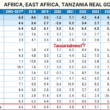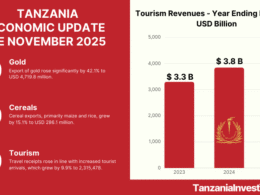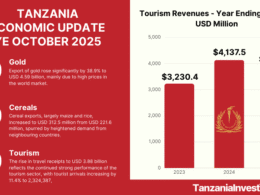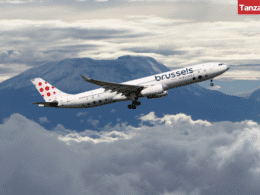TANZANIAINVEST has been interviewing Mr. Richard Rugimbana, Executive Secretary of the Tourism Confederation of Tanzania (TCT), which is the umbrella organisation representing the private business sector that is involved in travel and tourism, to learn about the Tanzania tourism sector and about the investment opportunities in this sector.
| Richard Rugimbana, Executive Secretary of the Tourism Confederation of Tanzania |
TI: To what extent has the private sector participated in the development of the Tanzania tourism sector?
Richard Rugimbana – Tourism Confederation of Tanzania: At the moment, the private sector has taken the leading role in promoting and developing tourism in Tanzania.
In fact, in the 70s and 80s and early 90s tourism was mainly dominated by the public sector because of the socialism framework that characterised Tanzania.
The private sector was very limited and not really allowed to grow.
But since the government decided to change its policy and to open up the economy, the private sector has really taken the leading role.
We have seen new development in terms of private hotels being built in Dar es Salaam, in Arusha and in wildlife areas both in the north and in the south.
Therefore, the private sector now is the leading engine in terms of growth of tourism.
TI: How would you define the attention of the government towards the needs of the private sector?
RR: Very positive.{xtypo_quote_right}[The Governement] listen[s] to our problems and they try to improve the conditions for the private investors.{/xtypo_quote_right}
At TCT we have very good relationship and dialogue with the ministry.
They listen to our problems and they try to improve the conditions for the private investors.
Of course they have not reached what we want them to reach but you can see that they listen and there is a constant improvement in the various policies, regulations and procedures to make life easy for the investors.
TI: What are the most important issues that you would like the government to address?
RR: We would like time to address the issue of taxation.
For example, in the hotel industry there are a high number of taxes and we believe there is the need to harmonise them and to have just a few main taxes.
They are working on that.
Licensing is another issue.
There are a number of licenses that one has to apply to do business in tourism.
We need to streamline that and maybe have a single license.
Also the rate of such licenses should be just enough for the purpose of regulating rather then being a source of income.
TI: How can this match with the fact that government wants an upscale market?
RR: The entry point should be encouraging because, at the end of the day, once you allow them to operate it means they can have good margins of profits and then they can also produce more and pay taxes.
There are standards that are going to be introduced very soon and there are also standards for tour operators and for travel agents so, apart from just the licensing, there are certain criteria one has to match.{xtypo_quote_left}Infrastructure is, to a large extent, slowing down the pace of development in these new areas.{/xtypo_quote_left}
TI: What is the level of tourism infrastructures that are available in Tanzania?
RR:That is a big problem in the sense that we cannot develop new areas, such as the southern circuit.
For investors to go into the south and put up a new project, infrastructures such as accessibility of roads, power and water are a problem; so, infrastructure is, to a large extent, slowing down the pace of development in these new areas.
Investment Opportunities in the Tanzania Tourism Sector
TI: What makes the southern circuit so attractive for new investments?
RR: The south offers a different product from the north, therefore, the whole concept here is to provide a wide range of tourism products.
The kinds of safaris in the south are different from the north for example. {xtypo_quote_right}The south offers a different product from the north, therefore, the whole concept here is to provide a wide range of tourism product.{/xtypo_quote_right}
The Selous game reserve is much more on the river, with very limited areas for driving.
The vegetation is different, together with the wild animals.
In the north, infrastructure is definitely good.
There is a lot of wildlife, of course, but the product base is different because of the unique Ngorongoro crater and the Serengeti park.
So, in terms of product, the north has a lot to offer in terms of a typical safari adventure.
TANAPA (Tanzania National Parks ) has a very strict policy in terms of the amount of investment that is allowed to be built in the Tanzania parks because the product is fragile and, if we want it to last for many years and for future generations, we have to limit the amount of investment.
At the same time, the competition is making difficult to find an area adequate for investment.
The south, on the contrary, is a new product altogether, very wild and underdeveloped, something new for the tourists.
But again accessing the south is a problem.
TI: What about Zanzibar and Pemba Islands?
RR: Zanzibar has very good beaches [as well as a] very good marketing name, history and tradition.
However it is a small island, which is about to reach a point where investments need to be limited.
In relation to Pemba, the development is still limited, but it is rather an island for fishing.
The beaches are in Zanzibar, on the east coast, in front of the coralline barrier.
TI: For its members, what is the benefit of working with the Confederation?
RR: We are the voice of the private sector of the tourism industry.
We have 7 members, seven sub sector associations.
We act as one voice for them when we dialogue with the government and NGOs but we also help the private sector build their capacity in terms of marketing, management and financing.
We deal with the big issues that come across all of the associations then each association is free to pursue its own objectives and goals.
TI: What are you lobbying for now?
RR: We lobbying to improve the investment climate for the members (taxation licensing and so on).
Also, there is the issue of manpower, where we import part of it from Kenya.
We are talking with the government about a new school for tourism coming up, hopefully by 2008, to be financed by the French government, but we also encourage the private institutions to develop causes that affect the tourism sector.
TI: What is your message to tourists and to investors looking at Tanzania tourism?
RR: Tanzania has a truly unique product that cannot be found anywhere else.
{xtypo_quote_left}We have such abundance of products that have yet to be developed so we ask investors to join forces with Tanzanians.{/xtypo_quote_left}You can find similar ones, but not the amount and quality of wildlife that we have here.
We have the Ngorongoro, the largest unbroken caldera in the world; the Serengeti, the biggest plane in the world; Selous, the biggest game reserve in the world where hunting is allowed.
We have mount Kilimanjaro, the single biggest mountain in the world with snow, in the middle of equator.
We have Zanzibar with all its tradition and history and its white sand beaches.
There is a lot to see in Tanzania.
For the investors we are inviting them.
We have such abundance of products that have yet to be developed so we ask investors to join forces with Tanzanians and, in the long run, when compared to so-called similar destinations, the investors have a product that will sell for a very long time to come.











